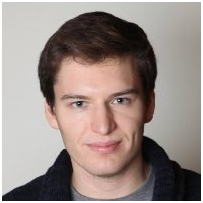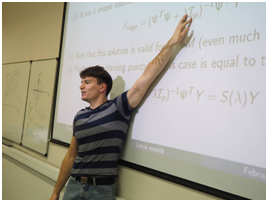successful admissions
of students enter the university of their choice
students consult Education Index when applying for universites
successful admissions
of students enter the university of their choice
students consult Education Index when applying for universites
Dmitry talks about his learning experience in the faculty of Economics of MSU , and Stanford, and shares his thoughts about Economics*
*This version of the article is reduced. Read the full article here.
 - Mitya, your course was devoted to methods of applied statistics and econometrics. Why are you interested in this topic and what it is useful for economists?
- Mitya, your course was devoted to methods of applied statistics and econometrics. Why are you interested in this topic and what it is useful for economists?
Will start with some history. Before you go to Stanford, I worked in Yandex (the leading search engine in Russia – approx.EI) - engaged in auctions, which sell advertising. The rules of this auction can be a little change and see how it will affect the behavior of advertisers and, consequently, on the revenues of Yandex. Originally I thought about these issues from a purely theoretical point of view: a diploma, which I wrote in the second year of study at the master NES (Russian School of Economics – approx. EI)was on applied microeconomics and auctions devoted to the contextual advertising. Yandex had to do more specific tasks, to work with the data. It was at this point I started to think about econometrics, not as a dry science, but about how it is a necessary practical tool.
Then I went to Stanford, started to take quite a lot of courses in the Department of statistics and noticed one specific thing. So it turns out that a large part of economic research is rarely some practically important result. <...> And for engineers, people with specialization in computer Sciences or biologists the same methods from the statistics course be very useful from a practical point of view. They take away regression, or something similar, and magically begin to fly helicopters, to be treated for cancer, be recognized in the image. And to solve all these different tasks use the same mathematical apparatus. Then I became interested in applied statistics.
In the end I got an interesting set of economic and statistics courses that allowed me to take another look at econometric education. The farther, the stronger seems to me that there is a large gap between the way we, economists, are taught to work with data and how you would work with them. Courses in econometrics focuses on methods with interesting and well-studied theoretical properties, and about the new algorithms we are almost unknown and are therefore not included in the standard courses. As a result, often when there is economic problem in which it would be possible to use new techniques, economists do not use them simply because they don't know about it. That is why I believe that it is useful to describe and discuss new methods, which is what we did on our course.<...>
How then, in your opinion, should be taught data analysis for economists?
This is a very difficult question, I don't know the right answer. The required alloy of two things: on the one hand, important and interesting economic problems, but on the other hand, statistical methods. <...>. I'm still nowhere, neither in Russia nor in the United States, did not meet the program which I thought would be perfect – therefore, the alignment of economic education in the field of data analysis is in itself an interesting challenge.
- Share impressions about the course which you have read on the Economics faculty?

Think it turned out well. For me it was an amazingly rewarding experience. Methodologically it is difficult to tell something heterogeneous audience – and my course was the students of economic faculty, faculty of mechanics, from the NES, MIPT, etc., ranging from sophomores and ending with my former teachers. It is very motivated to better prepare for classes. We had to rethink yet again everything I tell you to think and pass through itself.<...>
- Tell, please, what are you working on at Stanford?
I now try to combine modern methods of statistical analysis and modern problems of econometrics. Sounds nice, but too abstract, so here is an example. Now we are in a joint project by Eugene Drinking, he is also a graduate of the economic faculty. We are trying to come up with a tool to assess the quality of econometric models. <...>
- What role in all this played the Economics faculty?
Here I instilled a love of quantitative methods. Here I learned how to work with formal concepts, i.e. mathematics. While I've had time to read books and something to think about. Then it all came in handy when I was admitted to the Russian Economic School.
I helped Vladimir Ilyich Chernyak, who taught a course in discrete mathematics. I once first and was told that there was a NES. We had a very strong courses on macro, which I have, unfortunately, in the end somehow did not happen. With Evgeny Lukas we went twice student Olympiad in Samara. While we rode the train, he explained to us the results from the theory of probability, telling very simply and clearly about rather complex things. From these visits I learned much more than from standard courses.
And, of course, played a huge role in the environment in which I found myself. I had a very strong rate. We studied in one group with Dmitry Mukhin (he is now at Princeton, but also a lot of work with the economic faculty). 1-2 course we went to the pool in DASE. There had come before, but the next pair from Dasa could walk. I remember very well how we walked and talked all in a row. Discussed model of macro, micro tasks, some things from mathematics. It was such a wonderful time, when everything was new and strange.
And with me on the course studied Bob Korovkin, he is now at UCLA, and Vova Tyazhelnikov at UC Davis, Andrei Simonov, who receives a PhD in marketing at Business School in Chicago and, by the way, is doing really interesting things with data analysis.
- What do you need in order to get into Stanford?
 There is no perfect recipe, I can only tell you how it happened with me. It so happened that the thesis that I wrote back in the NES under the leadership of Sergei Izmalkov, was recognized as the best master's thesis that helped me to get good recommendations. While studying in NES I never thought about getting Ph.D. And only finished School, I realized I need to go, such a chance happens once in a lifetime. And especially, like, something happens. Eventually managed to get into Stanford, that was a lucky break.
There is no perfect recipe, I can only tell you how it happened with me. It so happened that the thesis that I wrote back in the NES under the leadership of Sergei Izmalkov, was recognized as the best master's thesis that helped me to get good recommendations. While studying in NES I never thought about getting Ph.D. And only finished School, I realized I need to go, such a chance happens once in a lifetime. And especially, like, something happens. Eventually managed to get into Stanford, that was a lucky break.
If you give any life advice, I will tell a banal thing: the more you become familiar with different things, the better. Need to try to learn as much as possible about different areas, the only way to understand what you really want.
It is very good that the faculty of different people come and tell their success stories in a completely different direction. Should try with a large number of people to communicate, because no one knows how, there are lots of different ways, and you just for this maze go, and at the end something happens.
- Significantly different from the facultywhere you studied, depending on which you read the course?
 It's been almost 10 years since I went to MSU. When I was in undergraduate, a lot of things were arranged differently. I see that the faculty is changing, and that's good. Became more openness, more willingness to learn. Each year with courses and lectures come graduates.
It's been almost 10 years since I went to MSU. When I was in undergraduate, a lot of things were arranged differently. I see that the faculty is changing, and that's good. Became more openness, more willingness to learn. Each year with courses and lectures come graduates.
Became more caring about students and individual work with the best of them. It is very good, and that's what I think it is much less. It is noticeable that students are better oriented to the realities of life outside University, than we at their age. It's great.
Well, I'm interested to help the faculty to solve the problems that face it. These tasks will be a lot a lot and always need to continually update courses to be a platform for scientific seminars and conferences, to learn from each other, to unite students and alumni. The main thing - not to stand still.
>> The full version of the article is available here.
>> Read more about the faculty of Economics of Moscow state University